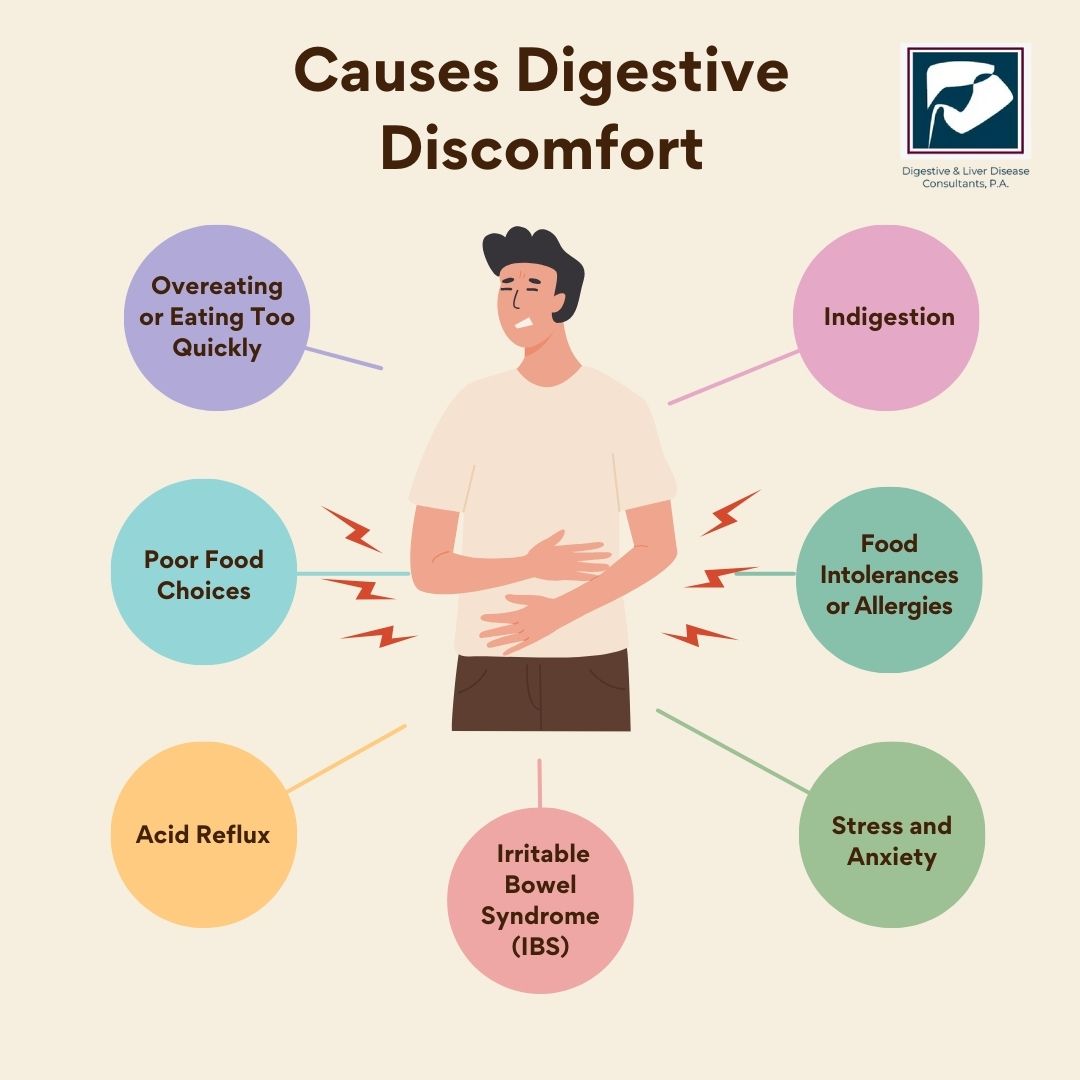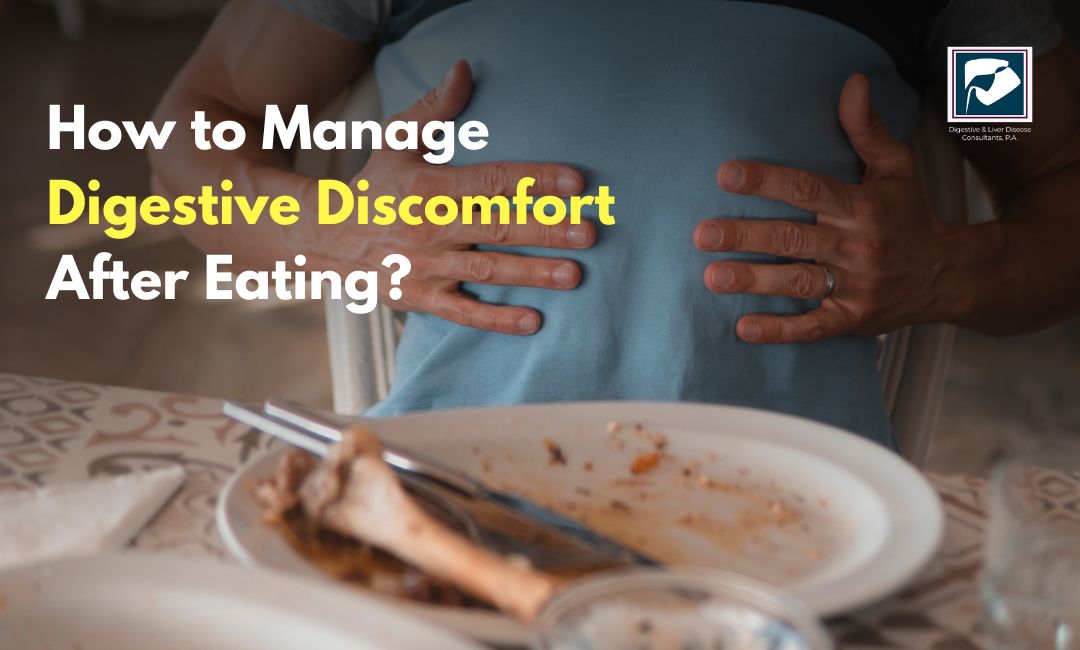Digestive discomfort after eating can be an uncomfortable and frustrating experience. Whether it’s bloating, indigestion, or gas, the feeling of being overly full or uncomfortable can affect your daily activities. While occasional digestive discomfort is common, recurring issues might indicate an underlying problem that requires attention. Understanding the causes and knowing how to manage discomfort can help you feel better and improve your overall digestive health.

What Causes Digestive Discomfort?
There are several reasons you might experience digestive discomfort after meals. Let’s take a look at some of the most common causes:
1. Overeating or Eating Too Quickly
Eating too much or consuming food too quickly can overwhelm your digestive system. Your stomach struggles to process large amounts of food at once, leading to bloating, gas, and discomfort.
2. Poor Food Choices
Some foods are known to cause digestive discomfort. Spicy foods, fatty foods, dairy products, or foods high in fiber may irritate your stomach, causing discomfort. Carbonated drinks can also lead to bloating.
3. Indigestion
Indigestion, or dyspepsia, is another common cause of discomfort after eating. It can cause a feeling of fullness, pain, and discomfort in your upper abdomen. It may also be accompanied by nausea and heartburn.
4. Food Intolerances or Allergies
Some people experience digestive discomfort due to food intolerances or allergies. For example, lactose intolerance can cause bloating, gas, and diarrhea after consuming dairy products, while gluten sensitivity can cause similar symptoms after eating gluten-containing foods.
5. Acid Reflux
Acid reflux, or gastroesophageal reflux disease (GERD), occurs when stomach acid flows back into the esophagus, causing a burning sensation in your chest (heartburn) and discomfort after eating.
6. Irritable Bowel Syndrome (IBS)
IBS is a chronic digestive condition that can cause abdominal pain, bloating, gas, and changes in bowel movements. Many people with IBS experience discomfort after meals.
7. Stress and Anxiety
Your mind and gut are closely connected. High stress levels can disrupt digestion, leading to discomfort after eating. Stress affects gut motility and can contribute to conditions like indigestion and IBS.
Tips to Manage Digestive Discomfort
If you’re dealing with digestive discomfort after eating, here are some tips that may help you feel better:
1. Eat Smaller, More Frequent Meals
Instead of eating large meals, try consuming smaller meals throughout the day. This reduces the workload on your digestive system and helps prevent bloating and discomfort.
2. Chew Food Thoroughly
Take your time to chew food properly. Chewing thoroughly breaks food down into smaller pieces, making it easier for your stomach to digest and reducing the risk of indigestion and bloating.
3. Avoid Trigger Foods
Pay attention to the foods that seem to cause discomfort and try to avoid them. This may include spicy foods, fried foods, caffeine, alcohol, and dairy if you have a sensitivity. Keeping a food diary can help you identify potential triggers.
4. Stay Hydrated
Drinking plenty of water throughout the day helps digestion by softening food and supporting the movement of nutrients through your digestive system. Avoid drinking too much water during meals, as it can dilute stomach acid and slow digestion.
5. Manage Stress
Since stress can affect digestion, finding ways to relax and manage stress is crucial for digestive health. Practicing mindfulness, deep breathing, yoga, or other relaxation techniques can help reduce stress and improve digestion.
6. Avoid Lying Down Immediately After Eating
Lying down right after eating can slow down digestion and increase the risk of acid reflux. Try to stay upright for at least 30 minutes after eating to allow your digestive system to do its job effectively.
7. Exercise Regularly
Regular physical activity promotes healthy digestion and can help reduce bloating and discomfort. Light activities like walking after meals can stimulate digestion and help relieve discomfort.
8. Use Digestive Enzymes
If your digestive system struggles to break down certain foods, digestive enzymes may help. These supplements assist in the breakdown of fats, proteins, and carbohydrates, reducing discomfort after meals.
9. Consider Probiotics
Probiotics are beneficial bacteria that support gut health. Taking a daily probiotic supplement or consuming probiotic-rich foods like yogurt or fermented vegetables can improve digestion and reduce bloating and gas.
When to See a Doctor
While occasional digestive discomfort is common, persistent or severe symptoms should not be ignored. If you experience any of the following, it’s important to seek medical advice:
- Chronic or severe pain in your stomach or abdomen
- Blood in your stool or vomit
- Unexplained weight loss
- Difficulty swallowing or feeling like food is stuck in your throat
- Recurrent nausea or vomiting
- Heartburn that worsens or does not go away
A healthcare professional, such as a gastroenterologist, can help identify the cause of your discomfort and provide a personalized treatment plan.
Conclusion
Digestive discomfort after eating can be a sign that your digestive system is struggling with certain foods or habits. By making small adjustments to your eating habits, managing stress, and avoiding trigger foods, you can reduce discomfort and improve your digestive health. If your symptoms persist or worsen, don’t hesitate to seek medical help. A doctor can provide valuable insights and treatment options to help you find relief.
If you're experiencing frequent or severe digestive discomfort, it’s important to consult a specialist. At DLDC, our experienced gastroenterologists can help diagnose and treat digestive issues to improve your quality of life. Contact us today to schedule a consultation.






